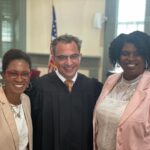Juneteenth, short for “June Nineteenth,” marks the day in 1865 when federal troops arrived in Galveston, Texas, to enforce the freedom of all enslaved people, more than two years after the Emancipation Proclamation. Juneteenth honors the end of slavery in the United States and is considered the longest-running African American holiday.
Chapel Hill, North Carolina, has a significant history in the civil rights movement. In 1947, the Journey of Reconciliation, a precursor to the Freedom Rides, tested the Supreme Court’s ruling against segregation in interstate bus travel. Despite facing violent opposition in Chapel Hill, the riders received support from local figures like Reverend Charlie Jones.
The Chapel Hill Nine were pivotal in the local civil rights movement. On February 28, 1960, nine African American high school students from Lincoln High School conducted a sit-in at the segregated Colonial Drug Store, sparking demonstrations that led to the desegregation of public spaces and schools by 1966. This legacy is commemorated through historical markers and community events.
Carrboro, North Carolina, also has a notable civil rights history. In 1961, the Vickers v. Chapel Hill-Carrboro City Board of Education case led to the integration of Chapel Hill-Carrboro High School. Stanley Vickers, an African American student, became the first to attend the previously all-white school. Robert “Bob” Drakeford, elected as Carrboro’s first African American mayor in 1977, spearheaded progressive initiatives such as the Carrboro Community Park and expanded the local bus system.
Braxton Foushee’s sit-in at Colonial Drug Store in 1960 marked a significant moment in Orange County’s fight for equality. Despite the area’s progressive reputation, this act challenged the segregation norms of the time.
Hillsborough, North Carolina, also has a rich civil rights history. In 1947, during the Journey of Reconciliation, Freedom Riders, including Bayard Rustin, were arrested in Hillsborough, testing the Supreme Court’s anti-segregation ruling in interstate travel. In 2022, Orange County Superior Court Judge Allen Baddour vacated charges against these activists, apologizing for the historical injustice.
Historic buildings like Dickerson Chapel AME Church and Mt. Bright Baptist Church were central to the civil rights movement in Hillsborough, serving as meeting places for activists. The Ku Klux Klan’s opposition, including cross burnings and night marches, highlighted the intense struggles faced by these communities. Preservation efforts of these sites aim to educate future generations about the area’s civil rights history.
Overall, the contributions of Chapel Hill, Carrboro, and Hillsborough to the civil rights movement reflect a community deeply committed to justice and equality.





